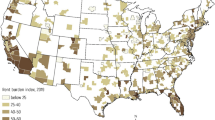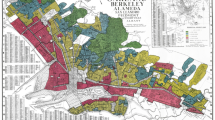Abstract
This paper examines the effect of homeownership status on individual subjective wellbeing indicators in urban China using a large nationally representative dataset. It is the first to gauge the relationship between homeownership and individual subjective wellbeing in the setting of China and is also among the few empirical studies concerning developing countries. The results show that the homeownership status does have a strong positive effect on both one’s housing satisfaction and overall happiness in urban China. Even after controlling for housing satisfaction in the equation, the homeownership status still positively affects one’s overall happiness, suggesting that the homeownership status might also contribute to other possible aspects of life satisfaction except for housing satisfaction. In addition, in terms of housing satisfaction, females seem to value much more on owning a house than males, while the subjective benefits of owing a house in large cities seem to be much smaller than in small cities.
Similar content being viewed by others
Notes
See Dietz and Haurin (2003) for a detailed discussion of the private and social benefits of homeownership.
The terms “happiness”, “subjective wellbeing” and “life satisfaction” are used interchangeably in this paper.
Except for the reason that people purchase housing units in order to live a better or happier life, another possible reason for the strong housing demand in China’s cities might be that people speculate in the housing market if they believe that housing prices will continue to rise in the future.
According to Shek (2010), the existing research studies on subjective wellbeing are predominantly conducted in the western developed nations and there are only very limited relevant evidences on China.
Those public housing options include renting low-cost rental units (Lian Zu Fang) and purchasing special affordable units (Jing Ji Shi Yong Fang) for low-income urban households, and renting public rental units at below-market prices (Gong Gong Zu Lin Fang) and purchasing price controlled units (Xian Jia Fang) for mid-income households.
See The Department of Sociology of Renmin University of China and the Survey Research Centre of Hong Kong University of Science and Technology (2006) for more detailed information about the survey. The latest available dataset of the survey is the 2006 wave.
In total, there are 31 provinces, municipalities, and autonomous regions in mainland China. The three provinces or autonomous regions that were not covered in the survey are Qinghai, Ningxia, and Tibet. Because the population in these three regions only accounts for a very small proportion of the whole nation, missing them should not affect the national representativeness of the survey.
Only the respondents are asked about their attitudes towards life satisfaction, and the survey does not provide any information on other household members in this regard.
China’s cities can be ranked according to their administrative statuses: province level, deputy province level, prefecture level, county level, and town level. For more detailed knowledge about China’s city system, please refer to Chung and Lam (2004). We divide them into large and small ones in terms of their administrative levels. That is to say, those cities at the county level or below are recorded as small cities, while those at the prefecture level or above are named as large cities.
According to Ferrer-i-Carbonell and Frijters (2004), assuming ordinality or cardinality of subjective wellbeing indicators makes little difference, though economists usually prefer to assume the ordinality of these indicators. We also run OLS regressions and get similar results, which are not presented in this paper due to space limit. Wooldridge (2002, pp. 504–508) provides some details about the ordered probit model.
To deal with the aforementioned concerns, a proper approach might be a natural experiment or an instrumental variable method (Dietz et al. 2003). However, given the available information in the dataset used in this paper, it is difficult to find good instrumental variables.
References
Appleton, S., & Song, L. (2008). Life satisfaction in urban China: Components and determinants. World Development, 36(11), 2325–2340.
Cai, F., & Wang, M. (2010). Growth and structural changes in employment in transition China. Journal of Comparative Economics, 38(1), 71–81.
Chung, J. H., & Lam, T.-C. (2004). China’s “City System” in flux: Explaining post-mao administrative changes. China Quarterly, 180, 945–964.
Chyi, H., & Mao, S. (2011). The determinants of happiness of Chinas elderly population. Journal of Happiness Studies. doi:10.1007/s10902-011-9256-8.
Cuñado, J., & de Gracia, F. P. (2011). Does education affect happiness? Evidence for Spain. Social Indicators Research. doi:10.1007/s11205-011-9874-x.
Davey, G., & Rato, R. (2011). Subjective well being in China: A review. Journal of Happiness Studies. doi:10.1007/s10902-011-9266-6.
Di Pasquale, D., & Glaeser, E. L. (1999). Incentives and social capital: Are homeowners better citizens? Journal of Urban Economics, 45(2), 354–384.
Di Tella, R., & MacCulloch, R. (2006). Some uses of happiness data in economics. Journal of Economic Perspectives, 20(1), 25–46.
Diaz-Serrano, L. (2009). Disentangling the housing satisfaction puzzle: Does homeownership really matter? Journal of Economic Psychology, 30(5), 745–755.
Dietz, R., David, H., & Richard, D. (2003). The social and private micro-level consequences of homeownership. Journal of Urban Economics, 54(3), 401–450.
Dolan, P., Peasgood, T., & White, M. (2008). Do we really know what makes us happy? A review of the economic literature on the factors associated with subjective well-being. Journal of Economic Psychology, 29(1), 94–122.
Elsinga, M., & Hoekstra, J. (2005). Homeownership and housing satisfaction. Journal of Housing and the Built Environment, 20(4), 401–424.
Ferrer-i-Carbonell, A., & Frijters, P. (2004). How important is methodology for the estimates of the determinants of happiness? Economic Journal, 114(497), 641–659.
Frey, B. S., & Stutzer, A. (2002). What can economists learn from happiness research? Journal of Economic Literature, 40(2), 402–435.
Guven, C., & Sørensen, B. E. (2011). Subjective well-being: Keeping up with the perception. Social Indicators Research. doi:10.1007/s11205-011-9910-x.
Huang, Y., & Clark, W. A. V. (2002). Housing tenure choice in transitional urban China: A multilevel analysis. Urban Studies, 39(1), 7–32.
Knight, J., Song, L., & Gunatilaka, R. (2009). Subjective well-being and its determinants in rural China. China Economic Review, 20(4), 635–649.
Li, S.-M., & Huang, Y. (2006). Urban housing in China: Market transition, housing mobility and neighbourhood change. Housing Studies, 21(5), 613–623.
National Bureau of Statistics of China. (2011). No. 9 report on the economic and social development achievements during the eleventh-five year plan (in Chinese). http://www.stats.gov.cn/tjfx/ztfx/sywcj/t20110307_402708357.htm.
Nielsen, I., Smyth, R., & Zhai, Q. (2010). Subjective well-being of China’s off-farm migrants. Journal of Happiness Studies, 11(3), 315–333.
Oreopoulos, P., & Salvanes, K. G. (2011). Priceless: The nonpecuniary benefits of schooling. Journal of Economic Perspectives, 25(1), 59–184.
Oswald, A. J. (1997). Happiness and economic performance. Economic Journal, 107(445), 1815–1831.
Parker, L., Watson, D., & Webb, R. (2011). Family fortunes: Gender-based differences in the impact of employment and home characteristics on satisfaction levels. Journal of Socio-Economics, 40(3), 259–264.
Rohe, W. M., & Basolo, V. (1997). Long-term effects of homeownership on the self-perceptions and social interaction of low-income persons. Environment and Behavior, 29(6), 793–819.
Rohe, W. M., & Stegman, M. A. (1994). The effects of homeownership on the self-esteem, perceived control and life satisfaction of low-income people. Journal of the American Planning Association, 60(2), 173–184.
Rossi, P. H., & Weber, E. (1996). The social benefits of homeownership: Empirical evidence from national surveys. Housing Policy Debate, 7(1), 1–35.
Shek, D. T. L. (2010). Introduction: Quality of life of Chinese people in a changing world. Social Indicators Research, 95(3), 357–361.
Shek, D. T. L. (2011). Quality of life research: Responses to emerging issues in a changing world. Social Indicators Research, 100(3), 371–374.
Shlay, A. B. (2006). Low-income homeownership: American dream or delusion? Urban Studies, 43(3), 511–531.
Teck-Hong, T. (2011). Housing satisfaction in medium- and high-cost housing: The case of greater Kuala Lumpur, Malaysia, Habitat International. doi:10.1016/j.habitatint.2011.06.003.
van Praag, B. M. S., Frijters, P., & Ferrer-i-Carbonell, A. (2003). The anatomy of subjective wellbeing. Journal of Economic Behavior & Organization, 51(1), 29–49.
Vera-Toscano, E., & Ateca-Amestoy, V. (2008). The relevance of social interactions on housing satisfaction. Social Indicators Research, 86(2), 257–274.
Wang, S.-Y. (2011). State misallocation and housing prices: Theory and evidence from China. American Economic Review, 101(5), 2081–2107.
Wang, P., & Vander Weele, T. J. (2011). Empirical research on factors related to the subjective well-being of Chinese urban residents. Social Indicators Research, 101(3), 447–459.
Wei, S.-J. (2011). Mating competition and housing market characteristics. Paper presented at the 13th NBER-CCER annual conference.
Wooldridge, J. M. (2002). Econometric analysis of cross section and panel data. Cambridge: The MIT Press.
Wu, J., Gyourko, J., & Deng, Y. (2011). Evaluating conditions in major Chinese housing markets. Regional Science and Urban Economics. doi:10.1016/j.regsciurbeco.2011.03.003.
Acknowledgments
I would like to thank valuable comments and suggestions from one anonymous referee. I acknowledge the Department of Sociology of Renmin University of China and the Survey Research Centre of Hong Kong University of Science and Technology for providing the survey data. This study is under the financial support from National Natural Science Foundation of China (No: 71003005; 71133003).
Author information
Authors and Affiliations
Corresponding author
Rights and permissions
About this article
Cite this article
Hu, F. Homeownership and Subjective Wellbeing in Urban China: Does Owning a House Make You Happier?. Soc Indic Res 110, 951–971 (2013). https://doi.org/10.1007/s11205-011-9967-6
Accepted:
Published:
Issue Date:
DOI: https://doi.org/10.1007/s11205-011-9967-6




